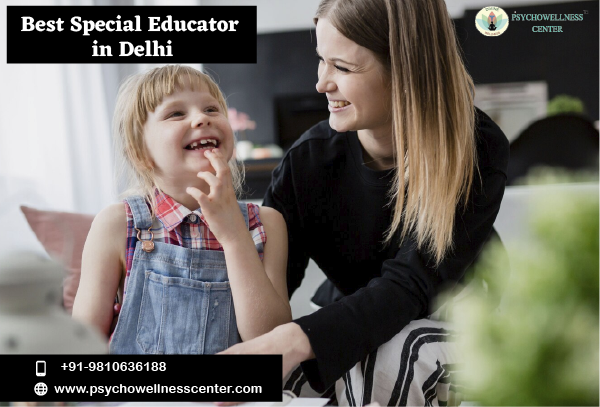In the journey of educating children with special needs, collaboration between special educators, parents, and therapists is crucial for the child’s success. Each of these professionals brings a unique set of skills and perspectives, and when they work together, the child receives a comprehensive approach to their development. This collaborative effort ensures that all aspects of the child’s growth, including academic, social, emotional, and behavioural, are effectively addressed. At Psychowellness Center, we emphasise the importance of this teamwork in supporting students with special needs.
The Role of Special Educators
Special educators are trained to work with children who have a wide range of disabilities, including learning disabilities, autism spectrum disorder (ASD), developmental delays, and physical impairments. They are responsible for designing individualised education plans (IEPs) that cater to the unique needs of each student. Their role extends beyond academic instruction; they also provide behavioural support, social skills training, and emotional development.
A special educator’s role is not limited to teaching; it includes constant assessment of the child’s progress and adapting teaching methods accordingly. They work closely with therapists and parents to ensure that the child’s educational experience is consistent across different environments, be it at school, home, or therapy sessions.
The Role of Parents
Parents are the child’s first teachers and advocates. They understand the child’s needs, behaviours, and triggers in a way that no one else can. Parents’ involvement is essential in the initial stages of intervention, as they provide insights into the child’s daily routine, behaviour, and social interactions. Their collaboration with special educators and therapists is invaluable because they can reinforce learning at home and provide continuity in the child’s development.
At Psychowellness Center, we ensure that parents are involved in the process from the very beginning. We encourage open communication, providing parents with resources and strategies to support their child’s learning at home. This partnership strengthens the foundation of trust and collaboration, which is crucial for the child’s growth and progress.
The Role of Therapists
Therapists, including speech therapists, occupational therapists, and behavioural therapists, work alongside special educators and parents to address specific needs related to communication, motor skills, and behaviour. These professionals bring specialised knowledge and therapeutic techniques that complement the educational strategies used by special educators. For instance, speech therapists focus on improving communication skills, occupational therapists help with daily living skills and sensory integration, while behavioural therapists address emotional and behavioural challenges.
At Psychowellness Center, therapists such as Dr. R.K. Suri, a clinical psychologist, integrate cognitive-behavioural therapy (CBT) with speech therapy, addressing behavioural issues and communication challenges for children facing learning difficulties. Additionally, Jyotsna Wadhwa, a renowned special educator at our center, specialises in working with children with autism, providing tailored interventions to support their academic and social development.
Benefits of Collaboration
The collaboration between special educators, parents, and therapists leads to several benefits, including:
- Comprehensive Support: When all members of the team are aligned in their goals and methods, the child receives consistent and comprehensive support that addresses all aspects of their development.
- Consistency Across Environments: Children with special needs often struggle with transitions. Having consistent expectations, strategies, and reinforcement across school, home, and therapy sessions helps the child adjust better to different settings.
- Better Understanding of the Child’s Needs: Special educators, parents, and therapists each bring different perspectives. When they collaborate, they gain a fuller understanding of the child’s challenges and strengths, leading to more effective strategies.
- Faster Progress: By working together, the team can track the child’s progress more accurately, adjusting in real time. This results in faster interventions and improved outcomes.
- Empowered Parents: Involving parents in the process gives them the tools and knowledge to support their child’s development at home. It also helps them feel more confident in advocating for their child’s needs in educational and therapeutic settings.
Psychowellness Center’s Approach
At Psychowellness Center, we prioritise the importance of collaboration in the care and education of children with special needs. Our approach integrates a team of skilled professionals, including special educators, speech therapists, occupational therapists, and top psychologists, all working together to create a personalized plan for each child. This team-oriented approach ensures that all the child’s needs are addressed in a comprehensive and cohesive manner.
We also believe in the power of parent involvement and regularly organise workshops and training sessions for parents, equipping them with strategies to support their child’s learning at home. Additionally, our team is always available for consultation, providing parents with ongoing guidance and support.
Conclusion
Collaboration between special educators, parents, and therapists is not just a practice; it is a cornerstone of effective intervention for children with special needs. By working together, these professionals can ensure that children receive the support they need to thrive academically, socially, and emotionally. At Psychowellness Center, we understand that every child’s journey is unique, and through collaboration, we help them unlock their full potential.
Through our holistic and collaborative approach, we strive to make a positive difference in the lives of children with special needs, empowering them to achieve success in all areas of life.
References:
- Suri, R.K., Wadhwa, J. (2021). Integrating therapy for special needs children. Psychowellness Center Publications.
- Singh, A. (2020). The role of therapists in special education. Special Needs Journal, 12(2), 45-49.
- Patil, R. (2019). Parent involvement in special education: The key to success. Journal of Special Education, 15(4), 78-82.
Contributed by: Ms. Sakshi Dhankhar, Counselling psychologist

